Congratulations on the arrival of your little one! If you’re looking for a modern and unique name for your baby boy, inspired by Lord Vishnu and starting with the letter ‘A’, we are here to help you find the perfect name.
In the vast tapestry of Hindu History, few deities evoke as much reverence and devotion as Lord Vishnu, the preserver of the universe. His many avatars and manifestations hold profound significance, embodying virtues and qualities that inspire countless devotees. As parents, we seek names that resonate with the divine, hoping to bestow upon our children a legacy of strength, wisdom, and grace.
When I began exploring Hindu baby boy names starting with ‘A’ associated with Lord Vishnu, I was captivated by the depth and richness of our cultural heritage. Each name is not merely a label but a prayer, a blessing, and a beacon of divine light that we wish to bestow upon our newborns.
Through this exploration, may you find the perfect name for your little one a name that reflects the divine grace of Lord Vishnu and sets a foundation of strength and virtue for your child’s journey through life. Welcome to this sacred voyage of discovery, where tradition meets contemporary and the divine blessings of Lord Vishnu guide us every step of the way.
Find a Range of Hindu Baby Boy Names Starting With ‘A’ that are Associated With Lord Vishnu
Achyuta means "imperishable," "indestructible," or "one who never falls." The name signifies someone who is eternal, unchanging, and infallible.
Ajitabh is a Sanskrit name that means "One who has conquered the sky" or "One whose splendor is invincible." The name is composed of two parts: "Ajit," which means "invincible" or "unconquered," and "Abh," which refers to "light" or "splendor." Hence, Ajitabh signifies a person whose radiance and glory cannot be subdued.
Anay is a name of profound significance. In Sanskrit, the name Anay means "without a superior" or "one who has no leader," symbolizing a person who is self-sufficient and sovereign.
Arindam means "one who has killed all his enemies" or "protector." It signifies strength, valor, and the ability to overcome obstacles.
Anirvinna (अनिर्विण्ण) is a name of Sanskrit origin that means "one who is never despondent," "unshaken," or "undiscouraged." The name is derived from the combination of "an" (अन्) meaning "not" and "nirvinna" (निर्विण्ण) meaning "disheartened" or "despairing."
Aniket (अनीकेत) is a Sanskrit name that means "one who makes the world his home" or "Lord of all," indicating someone who is not confined to one place.
The name "Aravinda" means "lotus" in Sanskrit. It symbolizes purity, beauty, and the divine, as the lotus flower is often associated with spiritual growth and enlightenment in Hinduism.
The name "Aravindalochana" is a compound of two Sanskrit words: "Aravinda" (अर्विन्द) meaning "lotus" and "Lochana" (लोचन) meaning "eyes." Hence, the name translates to "one with lotus-like eyes."
The name Anshuman is of Sanskrit origin. It translates to "radiant," "sunlight," or "one who is bright like the sun." The term derives from "Anshu," meaning "ray" or "beam," and "Man," meaning "one who possesses."
The name "Arvindaksha" is derived from Sanskrit, where "Arvind" means "lotus" and "Aksha" means "eyes." Therefore, Arvindaksha translates to "One with Lotus-like Eyes."
Anish is a Sanskrit name that means "supreme," "sovereign," or "lord." It is often used to signify someone who is the master or ruler, having no one above them. In some contexts, it is also interpreted as "without a master" or "one who has no superior."
Aavartanah means "He who repeats or cycles." In a broader sense, it refers to the one who is involved in the cyclical process of creation, preservation, and destruction in the universe. This name signifies the repetitive and eternal nature of cosmic cycles, representing the idea of rebirth, renewal, and the continuity of life.
Aadhira is a Sanskrit-origin name that means "Moon." It represents the cool, calm, and serene qualities associated with the moon. The name is often chosen for its connotation of beauty, tranquility, and grace.
"Ameyatma" is derived from Sanskrit, where "Ameya" means "immeasurable" or "infinite," and "Atma" refers to the "soul" or "self." Thus, "Ameyatma" can be interpreted as "the one with an immeasurable soul" or "the one whose soul is boundless."
Anagh (अनघ) means "sinless," "pure," "blemishless," or "faultless." It is a name that embodies the quality of being free from impurities and faults.
The name Aadhokshaja is derived from Sanskrit. It means "one who is not easily perceived" or "one who is beyond the reach of the senses." It signifies something that is beyond ordinary comprehension, often used to describe divine or supreme qualities.
The name Amritaya derives from the Sanskrit word amrita, which means "immortal" or "nectar of immortality." Thus, Amritaya can be interpreted as "one who is immortal" or "one who possesses the nectar of immortality."
Aarvish is a modern name with roots in Sanskrit and ancient Indian languages. The name is composed of two elements: "Aar" meaning "beginning" or "peace" and "Vish," which is often associated with the divine, particularly Lord Vishnu. Together Aarvish can be interpreted as "One who brings the beginning of peace" or "Peaceful beginning."
The name Aniruddha is derived from Sanskrit, where it translates to "one who cannot be obstructed" or "one who is unstoppable." It conveys the idea of someone who is free from hindrance and possesses an unstoppable spirit.
Adhrit means "the one who does not require support" or "self-sustained." It signifies someone who is independent and strong, embodying the essence of self-reliance and inner strength.
The name Aayodhana means "one who is invincible in battle" or "one who is unconquerable in war." It combines "Aaya" (which means "to come" or "arrival") and "Yodhana" (which means "battle" or "combat").
Anantashayana is a name derived from Sanskrit, where it is composed of two elements: "Ananta," meaning "infinite" or "endless," and "Shayana," meaning "reclining" or "resting." Thus, Anantashayana can be interpreted as "the one who reclines infinitely" or "the eternal recliner." This name is closely associated with the Hindu deity Vishnu, who is often depicted as resting on the cosmic serpent Shesha, also known as Ananta, in the cosmic ocean.
The name Amitabh means "one with boundless splendor" or "one with immeasurable brightness." It is derived from the Sanskrit words "Amit" (boundless) and "Abha" (light or splendor).
Ajaya is a name of Indian origin, primarily derived from Sanskrit. The meaning of Ajaya is "unconquered" or "invincible," which signifies strength and resilience. This name is often associated with the qualities of determination and perseverance.
Aarav is derived from the Sanskrit word "आरव" (Aarav), which means "peaceful" or "calm." It signifies someone who is calm and composed, radiating tranquility and serenity. The name is often associated with a person who brings peace and harmony to their surroundings.
The name Akshaj is of Sanskrit origin and means "unshakable" or "one who is stable." It is derived from "Aksha," which signifies "a strong and steady foundation."
The name "Ambareesh" is derived from Sanskrit, where "Ambar" refers to the sky or heavens, and "Isha" means Lord or Ruler. Hence, Ambareesh can be interpreted as "Lord of the Sky" or "He who commands the heavens."
Akshara is derived from the Sanskrit word "अक्षर" (Akṣara), which means "imperishable," "eternal," or "indestructible." It is composed of two parts: "A" (not) and "Kshara" (perishable or destructible). Thus, Akshara literally translates to "that which is indestructible or eternal."
Arhat is a Sanskrit word that translates to "one who is worthy" or "deserving." In a broader spiritual context, it signifies an individual who has attained Nirvana (liberation from the cycle of birth and death) and has thus achieved enlightenment.
Aadhavan (आधवन) translates to "sun" or "brilliant like the sun" in Tamil. It signifies radiance, brilliance, and the source of life and energy, much like the sun itself.
The name "Akshobhya" is derived from the Sanskrit roots "a" (meaning "not") and "kshobhya" (meaning "disturbable" or "shakeable"). Hence, "Akshobhya" translates to "the one who cannot be disturbed" or "the unshakable one." It signifies immovability, steadfastness, and an unflinching nature.
The name can be translated to "lord of the unconquered" or "one who cannot be defeated." The Sanskrit roots are "Ajit" (unconquered or invincible) and "Ish" (lord or god).
Aarush means “first ray of the sun” or “radiant.” It signifies the dawn and is often associated with brightness and the beginning of something new.
Avyay (अव्यय) is derived from Sanskrit and means "imperishable" or "eternal." It signifies something that is not subject to decay or destruction, reflecting the concept of permanence and continuity.
Adideva means "the primeval god" or "the first god." The name signifies the primordial, eternal, and supreme being, often associated with Lord Vishnu in Hindu mythology.
Ananta means "infinite," "endless," or "eternal" in Sanskrit. The name signifies boundlessness and the infinite nature of the universe.
Avanindra translates to "Lord of the Earth" or "King of the Earth." It is a compound of two Sanskrit words: "Avani" (earth) and "Indra" (lord or king).
Anayaka means "one who leads" or "one who guides." It denotes a leader or someone who shows the way.
Amey (अमेय) is a name of Sanskrit origin, and it means "boundless," "immeasurable," or "infinite." The name signifies something that cannot be limited or measured, embodying the qualities of infinity and limitlessness.
Avyukta (अव्युक्त) is a Sanskrit name that means "clear," "unconfused," or "one who is crystal clear." It is derived from the root words "a" (negation) and "vyukta" (confused), collectively implying a state of clarity and purity.
Amoda is a name of Sanskrit origin, predominantly used in India. It carries several meanings, such as "happiness," "joy," and "the one sharing happiness and joy" Achintya is a name of Sanskrit origin, meaning "incomprehensible," "inconceivable," and "unimaginable." It also signifies "healer of all worries" and "release of tensions" Amarendra is a revered name in Hindu culture, signifying "Lord of the Immortals." It is derived from two Sanskrit words: "Amara," meaning "immortal," and "Indra," the name of the king of the gods in Hindu mythology. Together, the name represents a supreme deity who rules over the immortal beings.
The name "Amritesh" is derived from two Sanskrit words: "Amrit" (अमृत) meaning "immortal" or "nectar of immortality" and "Ish" (ईश), which means "lord" or "ruler." Therefore, Amritesh can be interpreted as "Lord of Immortality" or "Lord of the Nectar of Immortality."
Cultural and Scriptural Roots of Vishnu’s Names
The names associated with Lord Vishnu are not mere words, but sacred vibrations that carry immense metaphysical power and cosmic consciousness.
In the ancient Vedic texts and Upanishads, Vishnu’s names emerge as profound theological expressions of divine attributes. The Vishnu Sahasranama—the thousand sacred names of Vishnu—represents the most comprehensive compilation of these divine appellations. Each name is a window into the Lord’s infinite manifestations, revealing layers of spiritual wisdom that transcend ordinary comprehension.
Consider the transformative verse from the Vishnu Sahasranama:
“नमः विष्णवे प्रभवे सर्वशक्तिशाय विश्वाय”
Namah Vishnave Prabhave Sarva-Shakti-Shaya Vishvaya
Meaning: Salutations to Vishnu, the Supreme Lord, who is the source of all power and encompasses the entire universe.
These sacred names are not merely linguistic symbols but living embodiments of divine energy. When parents choose a name rooted in Vishnu’s divine attributes, they are not simply selecting a word, but invoking a spiritual lineage that connects the child to cosmic consciousness.
Final Words
Naming a child after Lord Vishnu is a profound spiritual responsibility and an extraordinary blessing. It is an intimate connection between the divine and the familial, a sacred thread that weaves the child’s destiny with the cosmic rhythms of existence.
By selecting a name inspired by Vishnu, parents are not just christening their child; they are bestowing a sacred mantle of protection, wisdom, and spiritual potential. Each name carries within it the potential for profound transformation, guiding the child towards righteousness, compassion, and spiritual evolution.
I conclude with a heartfelt Sanskrit blessing:
“विष्णोः नाम्ना यः सदा पूज्यते तस्य जीवनं मङ्गलम् भवेत्”
Vishnoh Naamna Yah Sadaa Poojyate Tasya Jeevanam Mangalam Bhavet
Meaning: One who is always honored by the name of Vishnu shall have a life filled with auspiciousness and divine grace.
May this divine connection illuminate the path of your beloved child, blessing their journey with wisdom, strength, and spiritual radiance.










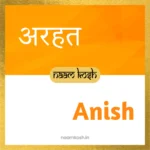



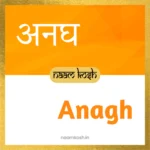







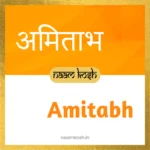






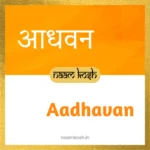
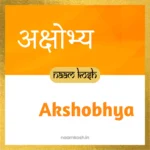



















Pingback: Best A to Z Baby Boy Names Inspired by Lord Krishna Revealed - Naamkosh